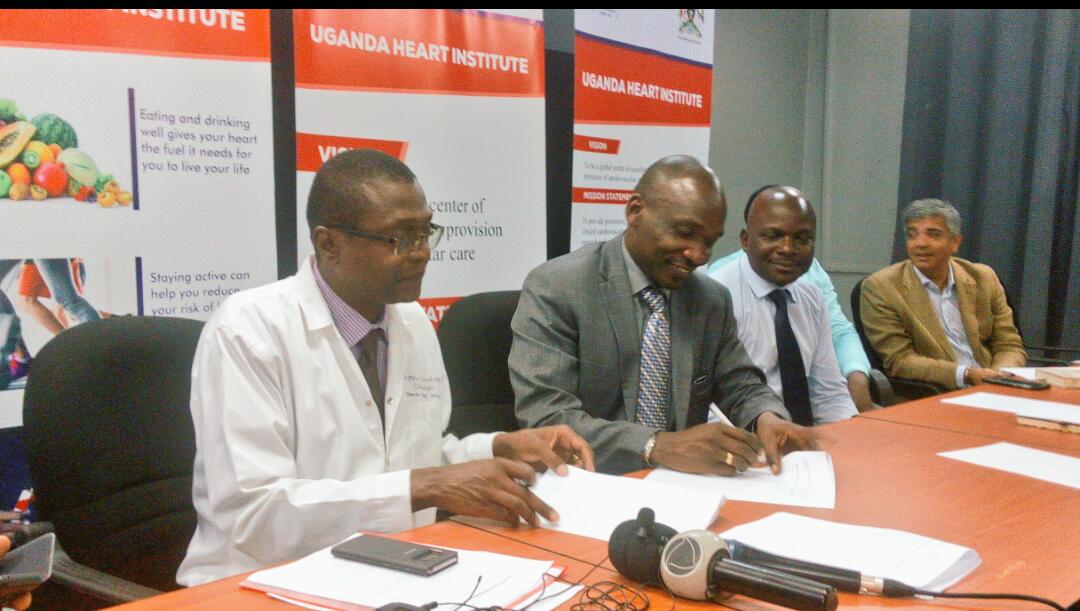Government through Uganda Heart Institute (UHI) has entered into a partnership with Swiss based pharmaceutical giant, Norvatis International AG, in an effort that will see patients of Non Communicable Diseases (NCDs) in Uganda’s public health facilities access treatment at affordable costs.
On Monday, a Memorandum of Understanding (MoU) was signed by Dr Peter Lwabi, a cardiologist at UHI and Dr Nathan Mulure, the Cluster Head for Norvatis in Southern-East Africa.
Norvatis through its subsidiary, Sandoz Pharmaceutical, a joint stock company registered in Slovenia will offer a portfolio of fifteen drugs at a much cheaper cost (US$ 2 pharmacy price and US$ 1 on importation) for a monthly dose for key NCDs like cardiovascular diseases, diabetes, breast cancer and respiratory illnesses.
“NCDs are a threat in Africa because of the change in lifestyles. People no longer walk for 6kms as it used to be in the past, which has reduced exercises,” Mulure said on Monday during an event at Mulago hospital where the MoU was signed.
Norvatis AG is a global health care company based in Basel, Switzerland which provides health care solutions that address the evolving needs of patients and societies in areas of pharmaceuticals, eye care and generic medicines.
Its Novartis Access Program was introduced two years ago to provide medicines at affordable treatment to especially low and middle income countries.
“For a patient who is the poorest in the village and is hypertensive, at US$ 1, they can afford to take care of their treatment for a whole month. We know insurance in Uganda is not yet at its peak. We hope that by this price reduction, many patients will access these products. It’s a huge saving to the economy but also the patients who are paying out of the pocket,” Mulure told reporters.
Given that most patients battling NCDs will be on treatment for almost a lifetime, this places a significant economic burden on them since they have to purchase drugs for a long period.
He said that due to the cost (of drugs), many patients stop halfway while others start skipping daily prescriptions in a bid to save money.
“We hope that now the patients can afford to take treatment for a long time,” he said.
Norvatis also revealed plans to extend this partnership to faith based organizations and the private pharmacies, which according to statistics cater for a significant number of the patients in the country. Uganda Protestants Medical Bureau is one of the organizations that is being considered, Mulure said.
Mulure was however quick to add that the private health facilities with exploitative charges will not be considered.
Elsewhere on the African continent, this arrangement has been rolled out in Kenya, Rwanda and Ethiopia.
Dr Peter Lwabi of UHI said that the partnership between UHI and Novartis will contribute a lot towards reducing the cost of medicine.
“The costs of these drugs depends on the severity of one’s hypertensive condition. Patients with stage one high blood pressure, may be treated by one molecule.
Those with more serious hypertension could use two or three molecules. On average, the cheapest drug for a patient taking one molecule is about US$ 10 per month,” Dr Lwabi said, quoting what the average costs have been.
“This means that a patient with more severere disease can pay about US$ 30 per month,” he said
In 2016, 18 million people died from heart related diseases globally. Of these deaths, 82% were from the low and middle income countries, Uganda inclusive.
The STEPS survey conducted in Uganda by WHO discovered that one in five Ugandans have high blood pressure but only a few of them know they have it.
Of the total deaths registered in Uganda, 40% are due to NCDs. Out of the 40%, 13% are accidents, 9% heart diseases, 5% cancer, 3% diabetes and 10% others like sickle cells.
Under the MoU, Norvatis will also conduct trainings for health workers so as to improve their skills capacity in prescription and treatment of the patients.
“Some of these products in this portfolio could not feature on the procurement cycles of the Ministry of Health. But now that their prices have come down, they might start featuring. So, there is need for capacity building and training on how to prescribe these products,” said Mulure.
President Yoweri Museveni has in recent months continuously advocated for physical wellness as a way for Ugandans to prevent non communicable diseases.
During the launch of the National Day for Physical Activity in July this year, President Museveni urged Ugandans to emulate his example and avoid eating alot especially towards bed time.
“Avoid gluttony. Personally, I have heavy breakfast because it is what will run my body in the day’s course, my lunches are light because I want to avoid ulcers while supper rations are very little and consumed early in the evening. Avoid eating meals towards bedtime,” he said.










